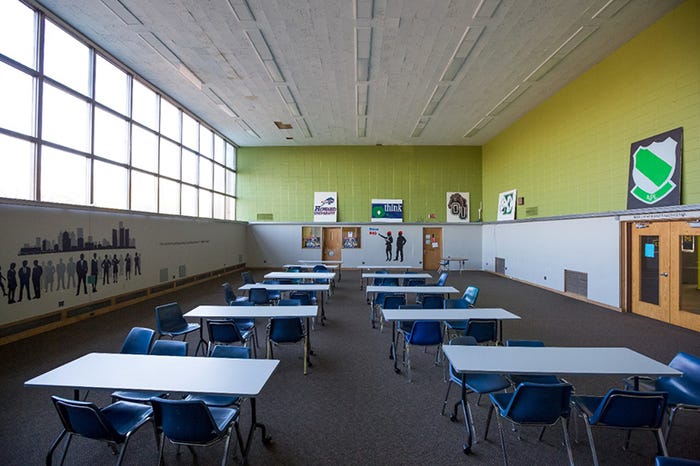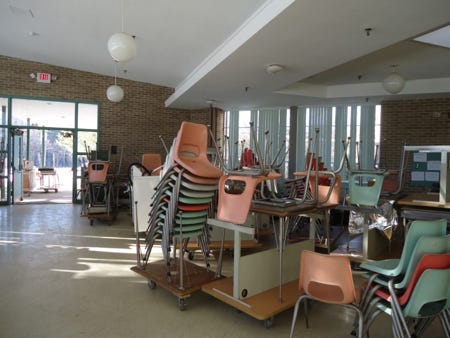How Companies are Addressing the Issue of F-Waste
To combat the estimated 8.5 million ton annual trash problem, companies across the globe are developing innovative programs and initiatives to divert f-waste from landfill.
Furniture waste (f-waste), an estimated 8.5 million ton annual trash problem, is becoming the new e-waste, according to experts. And in an effort to combat this growing waste problem, companies across the globe are developing innovative programs and initiatives for diverting f-waste from landfill.
One of the companies paving the path for the future of f-waste diversion is Herman Miller, a Zeeland, Mich.-based furniture designer and manufacturer. Approximately eight years ago, Herman Miller developed its rePurpose Program, which deals with surplus corporate assets through a combination of resale, recycling and donation. The program, which is managed by environmental firm Green Standards, helps companies meet sustainability goals and while aiding nonprofits by providing them with items they may normally have a hard time getting, such as large amounts of desks and chairs.
“The rePurpose Program is one of the best-kept secrets at Herman Miller. Rather than sending massive amounts of unwanted, usable furniture to landfill, we work with amazing organizations to find other uses for the items. If we cannot donate the items, we run them through a crude shedding operation to separate the metals from the plastics, which is a similar process to recycling cars,” says Herman Miller Director of Safety and Sustainability Gabe Wing. “More than 90 percent of office furniture ends up in landfill, and, as a furniture designer and manufacturer, we felt it was our responsibility to do something about this problem. After talking through different options, we came up with rePurpose as a solution to the f-waste problem.”
Over the years, Herman Miller has ramped up its sustainability efforts by creating products that are considered cradle-to-cradle in terms of the materials they are made with. Additionally, the company has worked to make its products easy to disassemble, ultimately giving the products a longer lifespan.
“Our goal for the rePurpose Program is to divert 125,000 tons of used products from landfill by 2023, which is about half of what we sell on an annual basis,” says Wing. “We’re hovering around 6,000 tons right now and have a long way to go to reach that goal, but our recent partnership with [vehicle manufacturer] General Motors (GM) will help us pick up the pace.”
With the new partnership, GM, Green Standards and Herman Miller will repurpose tens of thousands of pieces of office furniture and equipment from GM’s multi-site campus decommission into $1 million in donations to approximately 100 Michigan-based nonprofits over the next two years.
“By working with GM, an organization at the forefront of waste recovery and the circular economy, more business leaders will recognize the f-waste issue within their own organizations and be better prepared to address it,” says Green Standards Executive General Manager Trevor Langdon. “Every business encounters f-waste, and this partnership shows that there is an exciting, scalable solution to this problem.”
One of the beneficiaries of this initiative is Cody High School in Detroit, which has had a relationship with GM for six years. In addition to obtaining furniture and equipment from GM’s decommission, the school will receive a three-room makeover to enhance the educational learning experience of both students and faculty.
“Last year, we had a record year for landfill-free operations, and this partnership really goes hand-in-hand with our zero waste program and goals,” says General Motors Global Manager of Waste Reduction John Bradburn. “We have a strong relationship with Cody High School, and we have used a lot of materials from our manufacturing locations and office spaces to help make upgrades to the school. For example, we repurposed steel shipping baskets into urban farm gardens near Cody, and we revamped the school’s classrooms with our no-longer-needed dividers, desks, chairs and other materials.”

To date, GM has diverted approximately 550 tons of office materials from landfill through the rePurpose Program, and its goal is to divert more than 2,000 tons of materials from landfill. Additionally, Green Standards has diverted more than 30,000 tons of furniture and equipment waste from landfill since 2009.
Another company diverting f-waste from landfill is Concord, N.H.-based IRN: The Reuse Network, which operates a worldwide matchmaking service for surplus furniture from U.S. schools, companies and hospitals. IRN pairs organizations looking to donate their furnishings suitable for reuse with U.S. and international charities. Once pairings are made, IRN arranges trucks or tractor-trailers to come to the project site, hires a moving crew and ships the furnishings to the paired charity.

“In 2016, we shipped approximately 7.5 million pounds of furniture to 107 nonprofit recipients, and our goal for 2017 is to ship 10 million pounds to charities across the globe. No matter how much we can find and ship, the need in the U.S. (and worldwide) is a thousand times more than we can ever provide,” says IRN CEO and President Mark Lennon.
The 7.5 million pounds of furniture was collected from 39 companies, six healthcare systems, 14 elementary and secondary schools and 35 colleges and universities in 27 states and a Canadian providence.
“At IRN, we save money for our clients, provide furnishings to places where they’re desperately needed and keep millions of pounds of usable materials out of U.S. landfills,” says Lennon. “We’re able to make a living at it, and we have fun. It’s got to be one of the best jobs in the world.”
About the Author(s)
You May Also Like




